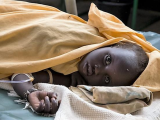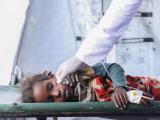Dec 12, 2012 (CIDRAP News) – United Nations (UN) officials yesterday launched a new initiative to eliminate cholera from Haiti and the Dominican Republic, using short-term measures such as targeted vaccine use and more permanent ones such as ensuring a clean drinking water supply.
UN Secretary-General Ban Ki-moon announced the details at UN headquarters in New York City, according to a UN press release. The comprehensive plan has been anticipated by some global health experts, who have predicted that it would cost $2.2 billion over the next decade and would include the biggest effort yet to improve Haiti's almost nonexistent water and sanitation system, thought to be a crucial step for halting the disease.
Epidemiologic and gene sequencing studies have uncovered strong links between the outbreak and the arrival of UN peacekeepers from Nepal who came to Haiti to assist after a massive earthquake devastated parts of the country in January 2010.
Government officials from Haiti and the Dominican Republic were on hand for the launch of the initiative, which will build on an existing campaign established a year ago by the presidents of the two countries, according to the UN.
Ban said that because cholera vaccines are in short supply, officials will target high-risk areas first, which will include densely populated urban areas and rural areas that lack access to health services. He said Haiti's cholera epidemic has led to 620,000 infections and 7,750 deaths.
The plan for Haiti will require $500 million over the next 2 years, with $215 million in existing funds available from bilateral and multilateral donors to support the initiative, Ban said. "The United Nations will do its part. We are committing $23.5 million, building on the $118 million the UN system has spent on the cholera response to date," he said.
He also vowed to use every opportunity in the months ahead to mobilize more funding, according to the release.
Meanwhile, the Center for Economic and Policy Research (CEPR), a progressive economic policy think-tank in Washington, DC, released a statement yesterday calling the UN's cholera elimination plan a welcome step, but said it falls short because key components of the water and sanitation system upgrades would be "needlessly delayed."
Mark Weisbrot, CEPR co-director, said the plan to eliminate cholera on Hispaniola by 2022 has benchmarks that call for only slow progress on the infrastructure needs during the first 3 years.
He also questioned where the funding would come from. The plan is based on $2.2 billion for Haiti and $70 million for the Dominican Republic, and Weisbrot noted that only a small fraction of the funding has been committed so far.
"It is unclear where the money for this is going to come from, and whether the international community, which has chronically underfunded responses to disasters in Haiti, will treat this any differently, and actually put up the cash to stop needless deaths," Weisbrot added. He suggested that the money the UN is spending on peacekeeping troops in Haiti should be used to eliminate cholera instead.
See also:
Dec 12 UN press release
Dec 11 CEPR statement
Nov 29 CIDRAP News scan "Global health groups craft cholera elimination plan for Hispaniola"


















